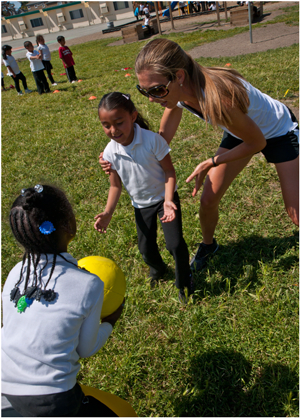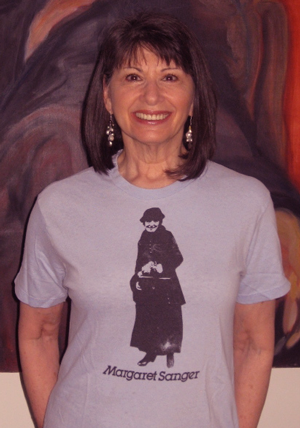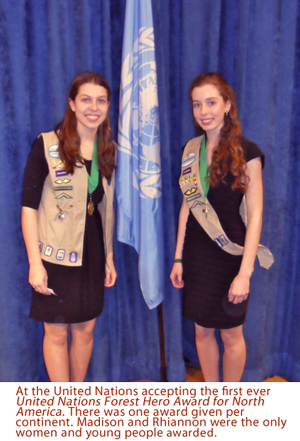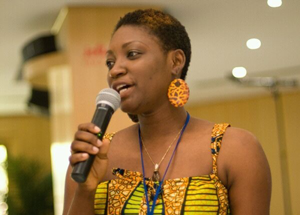Gloria Feldt's Blog, page 14
January 2, 2013
I’m Doing It: 6 New Speeches for Women’s History Month March 2013
Happy New Year! Time to pull out that spanking new calendar and start filling in 2013’s highlights.
Women’s History Month—March—is always a big highlight for me. I blog almost every day. Or when I’m smart, I recruit fabulous guest posters, like Liz O’Donnell and Deborah Siegel.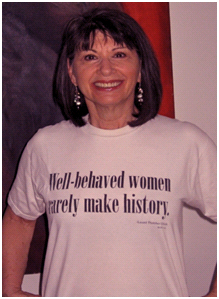
Why? Let’s face it—history has largely been defined through the male lens, recorded by male pens, with men as the main protagonists, and women, if noticed at all, in supporting roles. As the saying goes, you can’t be what you can’t see.
The converse—you can aspire to that which you can imagine—is why I created six new speeches for Women’s History Month, March 2013. I had fun cooking up these new ideas to make women’s history interesting, relevant, and inspiring to corporate, professional, civic, college, and nonprofit groups of all kinds:
—“The Power of Sheroes: Why Women Want Role Models, Mentors, and Sponsors, and How to Get Them”
—“Remember the Ladies: 3 Surprising Mistakes of the Women’s Movement and the Leadership Lessons They Can Teach Us”
—“On the Waves: Celebrating Top 10 Highlights of Women’s Advancement – and Envisioning the Journey Still Ahead”
—“Is This the End of Men or the Beginning of Women?”
—“What Will It Take for Women to Reach Parity in Leadership?”
—“Seriously, Henry Higgins? Must a Woman Be More Like a Man to Succeed?”
All my presentations are customized to address the group’s goals, and they can be delivered as keynotes or accompanied by a 9 Ways Leadership Power Tool Workshop.
Last fall, I taught my Arizona Sate University course “Women, Power, and Leadership” online for the first time. I had a chance to learn webinar skills. If you are interested in exploring a digital version of one of these speeches, we can talk about that option.
We’ll know we’ve reached gender parity when women’s visibility in the telling of history and the making of it, will be, well, just normal. With these six new Women’s History Month speeches, I aim to help make that happen. My personal goal is to fill up every day in March with a speech, workshop, webinar, op ed, or other action that tells women’s stories and inspires new ones, and so to share the fascinating history lessons we can learn from famous women, and many more you never heard of.
Contact me to request a speech or workshop by me. But whomever you choose for your program, please honor the women in your life and workplace by recognizing Women’s History Month this March at your organization.
Sometimes people say nice things like this about my presentations:
“Gloria Feldt delivered a powerful and stirring presentation at NowStreet’s “Women Transforming Our Financial Markets Symposium”… Women receive the tools and motivation to assume the leadership positions that will profoundly impact our economy and society.”
—Dara Albright, founder, NowStreet
“I was inspired by your presentation at the Massachusetts Conference for Women. The entire conference wowed me, but your session spoke to me more deeply than any other.” —Caroline O’Shea, Assistant Director of Employer Relations, Hiatt Career Center, Brandeis University
“Empower your invaluable women knowledge workers by hiring Gloria Feldt to speak to your executives, Board members, and high-performing women to crack the diversity nut American business has so far found to be as elusive as the creation of cold fusion.” — Victoria Pynchon, principal-She Negotiates, attorney-mediator
“Your Presentation was excellent. I’ve already used ‘power to’ versus ‘power over’ as a mantra for other relationships and conversations. The response is like an awakening in the people who hear it.” —Jennifer Brunner, former Ohio Secretary of State
“The best lecturer we had in my four years on the lecture board.” —Nick Goldberg, former Co-President, Brown University Lecture Board
“[O]ne of the most inspirational women in America.”
—Cindi Leive, Editor-in-chief of Glamour Magazine
“How moved I was!” —Eve Ensler
“Part den mother, part businesswoman, part Mae West.” —Texas Monthly
For more information, see www.GloriaFeldt.com.
Contact me to request a speech or workshop.
December 5, 2012
We’re Doing It And You Can Too: Here’s a 9 Ways Power Tools Planning Worksheet
On Thursday, December 6, I’ll be delivering a No Excuses Power Tools speech and mini-workshop at the amazing Massachusetts Conference for Women in Boston.
I’m told they expect over 7000 women this year, making it one of the largest women’s conferences in the country—and I think it will be among the most exciting.
Other speakers include former Ogilvy and Mather CEO Charlotte Beers, vulnerability scholar Brene Brown, and actor Kristin Chenowith who starred in one of my all-time fave Broadway shows, “Wicked,” among many other roles.
Come if you can, and if you do, please stop by and say “hello.” Even if you can’t, consider this Power Tools Worksheet my gift of intention to you for your “power to” do whatever you want to achieve. Bookmark it so you can reuse it any time you need to think through a problem or plan to achieve a goal. And if you need a quick refresher on the 9 Ways Power Tools, here’s a one-page summary.
November 30, 2012
Women Transforming Our Financial Markets
The next great leap for women is money and wealth building. If we understand its power. I’m excited to be joining Now Street and its fabulous founder Dara Albright plus a stellar lineup of speakers for this December 11 symposium, “Women Transforming Our Financial Markets.” It might be cold outside, gut I guarantee the wisdom in this room will be hot. Here are the full details.
NowStreet Media, leader in financial markets’ reform, is pleased to announce the agenda for its much anticipated “Women Transforming Our Financial Markets Symposium” being held on Tuesday, December 11th at Chadbourne & Parke’s conference center at 30 Rockefeller Plaza in New York City.
Presentations, workshops and panel discussions during an extensive full day program will address how new legislation, including the legalization of crowdfund investing and general solicitation, is transforming the financial markets and creating the optimum climate for America’s women to launch new businesses and maximize investment returns.
Speakers include:
Dara Albright, Founder of NowStreet
Amy Cortese, Accomplished Journalist, Speaker & Author
Luan Cox, Founder & CEO of Crowdnetic
Doug Ellenoff, Member of Ellenoff Grossman & Schole
Judith Feder, Managing Director at du Pasquier & Co., Inc
Gloria Feldt, Inspirational speaker, Author
John Frankel, Partner at ff Venture Capital
Sara Hanks, Co-founder and CEO of CrowdCheck
Hazel Henderson, Founder of Ethical Markets Media, LLC
Matthew Henninger, Founder of CEDI Society
Lori Hoberman, Partner of Chadbourne & Parke
Constance Hunter, Global Economist & Senior Advisor at ISN CC
James A. Jones, Director of Business Development for Accuplan
Jason Jones, Portfolio Manager of HighStep Capital
Candace Klein, Founder of Bad Girl Ventures & SomoLend
Connie Koch, President, Southern California Region of Keiretsu Forum
Danielle Lanyard, Founder of Green Breakfast Club
Mitchell Littman, Founding Partner of Littman Krooks
Gene Massey, CEO of MediaShares
Brian Meece, CEO of RocketHub
Monika Mitchell, CEO of Good Business International
Vince Molinari, CEO of Gate Technologies
Kathleen A Murray, Angel Investor and CEO of BoardmyBiz.com
Scott Purcell, Founder of Arctic Island
Phil Reicherz, Founder & Managing Partner at Magnolia Ventures LLC
Stacy Robin, Director, Marketing at EisnerAmper
Judy Robinett, Prominent Venture Investor
April Rudin, CEO of The Rudin Group
Barbara Russell, Co-Founder of The Social Internet Fund
Rich Salute, Capital Markets and SEC Practice Director with J.H. Cohn
Dr. Charles Sidman, Managing Partner of ECS Capital Partners and Angels
Greg Slamowitz, Co-CEO of Ambrose Employer Group, LLC.
McKenzie M. Slaughter, CEO of Prohaus Group & Beauty & The Bull Magazine
Robin Smith, M.D., MBA, Chairman & CEO of Neostem, Inc
Karla Valas, Managing Director at Fidelity Charitable
Kim Wales, Founder of Wales Capital
Michaela Walsh, Honorary Trustee of Women’s World Banking (WWB)
Freeman White, CEO of Launcht
Bestselling author, speaker, and professor, Gloria Feldt, will be hosting her acclaimed “Women, Power, and Leadership workshop”. This 45 minute interactive session will provide participants with the practical “Power Tools” needed to become unlimited in their lives, leadership, and careers. To sign up for this valuable workshop, please email us at workshops(at)nowstreetevents(dot)com.
There will also be an opportunity to demo the cutting-edge platforms that are driving the industry forward and helping the private markets to transition into a viable and functional institutional marketplace.
Attendees will include primarily female entrepreneurs, crowdfunding professionals & enthusiasts, angels, accredited investors; investment bankers; wealth managers; VCs; family offices; incubators; private equity firms; pre-IPO fund managers; hedge funds; brokers; secondary stock specialists; equity analysts; select members of the media as well as tax, legal and regulatory experts.
To download the full the agenda, please visit http://nowstreetjournal.files.wordpress.com/2012/11/agenda-for-women-transforming-our-financial-markets-symposium.pdf.
Admission tickets can be obtained at http://nowstreetwomen.eventbrite.com/. Complimentary press passes will be provided to pre-approved journalists and editorial staff. Please email us as press(at)nowstreetevents(dot)com for information on obtaining a press pass.
Dara Albright, NowStreet’s Founder, commented, “This symposium will allow some of America’s most accomplished business leaders to share their wisdom and encouragement with today’s rising female stars. We are eager to help more women achieve success in a transforming marketplace, and we are truly grateful to have the opportunity to honor the ladies who continue to raise glass ceilings and inspire new generations.”
ABOUT NOWSTREET:
Symbolizing the capital markets of tomorrow and the hope for a more prosperous economic future, NowStreet is known in various financial circles for its commitment to restoring economic prosperity through its efforts in repairing market structure. NowStreet has been on the forefront of many recent market transformations. We were one of the earliest voices covering the JOBS Act and advocating for a respectable new marketplace to support smaller cap growth companies. NowStreet’s acclaimed industry events attract some of the most prominent speakers in the financial industry as well as the legislature and provide investors; investment bankers; wealth managers; crowdfunding professionals and enthusiasts; VCs; family offices; incubators; private equity firms; pre-IPO fund managers; brokers; secondary stock specialists; equity analysts; entrepreneurs and small business owners; journalists as well as tax, legal and regulatory experts with an unparalleled informational and networking experience – all in a framework specifically designed for uncovering new opportunities and securing business. As a result of its numerous ground-breaking events and cutting-edge market commentary, NowStreet has rapidly emerged as a respected opinion leader in the industry and is continuously sought after for advice, guidance and referrals.
Additional information can be found at http://nowstreetjournal.com/
November 28, 2012
She’s Doing It: Amy-Willard Cross Clicked Ruby Slippers, Founded Vitamin W Media
Amy-Willard Cross knew her historic mission and found her power to achieve it was right there, within her. She tells 9 Ways how and she founded the media company Vitamin W, “100% Kardashian-free.”
Knowing her personal history enabled Amy-Willard to create the future of her choice. How’s that for using the old Power Tool #1?
Read and be energized…then sign up right here for Vitamin W’s free newsletter and they’ll donate $1 to one of five fabulous women’s charities. Here’s Amy-Willard:
Gloria Feldt: When did you know you had the power to start a woman-owned media company? What did it feel like?
Amy-Willard Cross: I tried to start a magazine—a Pariscope kind of guide for LA. I was just out of college and had never worked at a magazine, so I got a partner. Soon, though, I gave up and took a regular starter job which turned into decades of working in magazines.
Fast forward to the mid-aughts. I started a site of women’s oped—thinking that, like Dooce, I’d put something up and the world and advertisers would flock to me…but I missed that boat by a few years.
After a few years of watching the not-for-profit feminist blogosphere, I determined that the world needed a woman-owned media property that would promote women in every respect—our businesses, our nonprofits, ALL our stories—and gather together the 11 million women who support women’s organizations into a powerful audience.
I found a super-smart MBA partner who helped me develop a business plan—and then we started thinking about raising money. That same spring of 2011, I was at a conference to learn how to be an Angel investor—and realized, I don’t need to raise money from someone ELSE to start an online publication—I can afford to do with my own capital.
I had felt I had to ask someone else’s permission to take that risk. But I didn’t….It was like I was wearing those Ruby slippers all along. So now I just have to keep clicking my heels together so I can get to where I need to go. It’s not Kansas exactly, but my destination is far off.
GF: What is in your background that led you to your current work?
AWC: I’m the middle girl, not the beautiful one, or the tantrum-ing one (with an only son of an only son of an only son for a brother) so I learned to do dishes, not make a fuss and keep my head down and do my work. Or that’s how I see it.
I’m descended from a long line of feminists—I’m named for Frances Willard the suffragist and more—famously, temperance activist. My great grandmother worked alongside her, shoulder to shoulder but NOT bending elbows.
My grandmother was a divorcee with two MA’s and a Fulbright professor who was the first woman teacher at University of Damascus. She always told me to go to a women’s college. “In my day, you had to be 100 times, better than a man, in your day, it’ll be about 50 times.” She was a strong southern lady (and very conservative and made a huge impression on me)
I always knew I’d be a writer—I used to tell my grandmother I’d take a typewriter on my honeymoon. She didn’t contradict me. She wasn’t a huggy kind of granny—she was a formal finger bowl-practicing kind of woman who would scold me for reading War and Peace too fast.
I did follow her advice and went to Wellesley (the Agnes Scott of the North); my grandfather the minister would ask me whether I was graduating cum laude, magna cum laude or summa cum laude. I was magna, in the end, thankfully. Going to Wellesley was the best decision I ever made even though I felt too cool for it at the time; my favorite people are those I’ve met there or at later reunions. Anyone who did is smart and feminist enough for me to like. I even hire Wellesley people I find on Linked in…I’d hire from the Other Seven Sisters but somehow I got kicked out of that group and they won’t reply to me about why. Spammers at work?
As a child, I wasn’t into dolls or sports—just books and theater. I was in a small class of smart girls. I would count ads in the New Yorker for some reason. I marched for the ERA. I read Ms. in elementary school. In fifth grade, I wrote my first play—a dystopia where women were the oppressors and men the oppressed. (Conflict was solved with a promise of a vacation.)
As I got older, Germaine Greer, college guides and Our Bodies Ourselves kept me company—I didn’t need any sex ed as I decided that I couldn’t waste time with dating—I was anxious about getting into the ‘right’ kind of college. For middle class Americans, it seems to be like the threads of the Fates—which school you attend determines your life’s path.
I always swore I’d never work for women’s magazines, but a bankruptcy made me do it. Then I reviewed Naomi Wolf’s book where she did a byline count and I was shocked to see the odds of my getting published in the New Yorker were low just because I was a girl. And then I realized that the women who wrote for Harpers would write about how they liked porn, so I finally plunged into a Canadian women’s magazine which was tied into the feminist movement.
GF: Who are your role models? Why? What lessons did you learn from them?
AWC: I don’t know if I have any role models in real life…people that I could copy so that my life would be perfection. However, there are many people I look up to.
I love what Lawrence Lessig does—with creative commons and Rootstrikers. I am in awe of Brewster Kahle’s commitment to the Internet Archive. And Hillary Clinton for using her perfect smartness for good and to serve her country. And Soledad O’Brien who is not only a hard-working journalist who won’t take crap and spin who confronts big issues like being black in America, but also helps those less fortunate with a brilliant foundation that just pays tuition of young women.
I really admire Joanne Wilson aka The Gotham Gal for her bringing entrepreneurism to women (and women to entrepreneurism) and Rachel Sklar for creating the very positive phrase and idea of “Changing the ratio”. Both those women show the possibility of creating something new and powerful. Jessica Jackley with Kiva, as she figured out a whole new model of bringing money, directness and human storytelling to aid.
However, I do rely on a lot of Scarlett O’Hara’s wisdom, “I’ll think about that tomorrow. Tomorrow is another day.” Which to me means, you can confront any problem, just sometimes wait a bit—but not too long. Have a good night’s sleep or take a deep breath, then get back at it.
GF: What are you hoping to accomplish in your work?
AWC: My goal for VITAMIN W is to build a media platform with a powerful audience. I want Vitamin W to become a big voice for women online— for the most part on the internet, we are un-herded cats, except for Komen moments when we rise up. It’s time to aggregate our voices online.
for the most part on the internet, we are un-herded cats, except for Komen moments when we rise up. It’s time to aggregate our voices online.
I want this platform to help change the ways companies communicate with women. Companies need to reach us—the major purchasers—but they often do so in in a manner that is inauthentic and self-serving”. Vitamin W will provide space for companies to communicate in a new and different way—through strategic cause marketing and positive messaging. Many of the for profit, more substantive women’s sites are just a piece carved out of a media empire—a way to sell advertisers women’s eyeballs. Nothing more than that.
I don’t want to be a pair of eyeballs for sale. I want to take charge of that transaction between advertiser and publisher and change it.
I also want to use Vitamin W’s audience to for good—to help build up women’s businesses and support nonprofits by getting the word out about their work.
Making the site profitable means that we can afford to pay more writers and get good quality material. I have been going to conferences focused on women’s media and have met many people in the feminist blogosphere and was stunned to find out that blogs that had millions of readers were running as collaborative non–profits, and that they didn’t pay writers. I thought, what a bad model for a women’s press. There is no reason why we can’t have a woman-owned financially sustainable press that promotes our interests in every single way—from advertising to editorial.
GF: Is there a message you’d like to give to the world today?
AWC: That women, as a block, are powerful and have to assert our demographic power politically and economically. Add others who have been excluded such as Latinos and African Americans—and you see that we are the majority. The majority is supposed to rule—fairly.
GF: Is there a leadership lesson you have learned and would like to share?
AWC: From people I know who run businesses, I’ve figured out that the owner is standing at the abyss—that everyone behind her doesn’t know the reality and doesn’t want to. And that as a leader, you have to carry on with the abyss in front of you and not show anyone what could go wrong. Just think about NOT falling into its chasm.
Try to be as nice as you can to people. I’m a chaotic person to work for as everyone has told me—so I couldn’t be mean on top of that. Also, why spread bad feelings around.
GF: What other observations or advice about women, power, and leadership would you like to share?
AWC: Ask, or even better just do.
When I was younger, I used to wait to be asked…well sometimes. Once I was working at a film company on a project; there had been some big news story, a colleague wrote up an editorial and faxed it to the Times of London. I was flabbergasted at her boldness. But I never forgot it. You can reach as high as you can—sometimes you’ll grab the brass ring, or swinging vine or whatever. But you have to reach.
And speaking of doing, VITAMIN W Media is doing a very cool campaign: Her Voice, Her Cause, to raise funds for our five nonprofit partners: Girls Who Code; Hollaback!; Our Bodies, Ourselves; The 2012 Project; and Women, Action & the Media. Through November 27, VITAMIN W will donate $1 to these women-focused nonprofits for each new free newsletter subscriber, up to $10,000. You click and we’ll contribute!
November 21, 2012
She’s Not Only Doing It; She’s Shaking, Baking and Moving It
My definition of leadership is someone who gets something done. Read on for the inspiring story of Ashley Riley who saw something that needed to get done and did it in her Silicon Valley community. And watch…I think Fit Kids will be coming to a schoolyard near you soon—maybe because you’ll be the leader to make it happen.
As we all prepare to overeat those Thanksgiving goodies, what better time to promote kids’ fitness?
With Thanksgiving just around the corner, I thought it would be appropriate to pay homage and give thanks to Ashley Riley, one woman—a busy mom of four children under 11(!)—who is “doing it”. That is, creating a movement to bring health and fitness through active play to all kids.
I met Ashley in late August of this year. It was kismet—my good fortune. I had decided to look for part-time “community organizer” work, and she was looking for someone to help with her 5th child, her precious baby, Fit Kids.
Ashley founded Fit Kids in January of 2011 based on a simple premise that healthy activity and food should not just be for the affluent kids on the west side of the Peninsula but a right of all kids—regardless of ethnicity and socioeconomic or immigration status.
“Why?” Ashley pondered, “should a child born on this side of Highway 101 have different access to healthy activity and nutrition than their brothers and sisters in East Palo Alto and East Menlo Park (aka Belle Haven)? How can those of us in-the-know turn our backs on those children?”
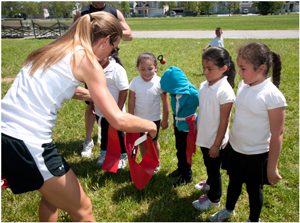 Indeed, how can we who are living through and benefitting from the modern Gold Rush of Silicon Valley 2.0 just stand by while kids only miles from our own go without healthy after school activities and food?
Indeed, how can we who are living through and benefitting from the modern Gold Rush of Silicon Valley 2.0 just stand by while kids only miles from our own go without healthy after school activities and food?
How can those of us who drive our Teslas, Mercedes and Lexuses from Palo Alto, Menlo Park, Atherton, and Los Altos through East Menlo Park to Facebook Headquarters and other technology giants on the other side of Highway 101, fail to notice what is going on in those neighborhoods, schools and communities we pass by?
Some basic facts will give you the picture. According to the School Accountability Report Card for 2010-2011, 96.5% of the students enrolled in the Belle Haven (East Menlo Park) school district are socioeconomically disadvantaged and 84.1% are English language learners. At one representative school in the district, Green Oaks, 89% are considered low income and 49% of parents did not graduate from high school.
How many folks stop and think about those kids and what kind of enriching after school activities they are signed up for? How many wonder what is in those free school lunches and breakfasts and snacks? How many give a damn about whether those kids are getting enough exercise and are healthy? Whether they are or will be productive and healthy model citizens?
Ashley simply gave a damn. No, that is not quite right. While many might be moved by these circumstances to give generously to a worthy non-profit, like the Boys & Girls Club, Ashley had a simple yet crazy beautiful idea.
Why not bring free after school fitness and nutrition classes to these kids where they are? Why not conduct these Fit Kids sessions on their home turf—at their schools, on their playgrounds, at their afterschool care centers or clubs? No transportation required. No
nanny or stay-at-home or part-time parent required to participate. No extra funds or special shoes, equipment or uniforms required.
Fit Kids would bring the caring and qualified coaches, the fitness equipment and the lessons to the deserving kids FOR FREE for 8 weeks per season.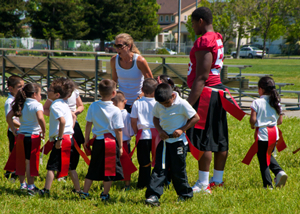
Ashley consulted with fitness, nutrition, coaching and child development experts. She sought out expert opinions from leading pediatricians such as Dr. Avery Faigenbaum, sports medicine and nutrition experts such as Dr. Clyde Wilson and children’s fitness
experts such as Russ Nuffer.
With laser-like focus and intention, in less than two years she created a Fit Kids movement that delivers FREE after school fitness programs to over 750 kids in the under-served communities of East Palo Alto, East Menlo Park and Redwood City.
So, Ashley saw a problem, found a solution and went bold. She went big. She drank her own healthy Kool-Aid and started The Fit Kids Foundation with the support of her circle of friends and family.
Thanks to Ashley and the tireless work of the amazing Fit Kids coaches, board of directors and team—Fit Kids is becoming an incredible force in the San Francisco Bay Area and beyond.
As Ashley often says, “You know, I think we are really on to something.” Sister—you have no idea how big this is going to be.
I’m so proud to be a part of it. Thank you on behalf of all the kids and communities you serve and will serve.
Happy Thanksgiving Day.
To learn more about Fit Kids, please visit www.fitkids.org If you like Fit Kids, please help us get the word out there – fitness, health and good nutrition is a basic right of every child – help us make this so.
P.S. If you are looking for something healthy for you and/or your fit kids or grandkids to do on Thanksgiving Day, please look for your local Turkey Trot. Fit Kids will be at the Applied Materials Silicon Valley Turkey Trot in San Jose, CA this Thanksgiving Day. Please look for the author and her family at the Fit Kids obstacle course.
TAMARA FAGIN resides in Los Altos, California with an active elementary school duo and a great mensch of a husband with an even greater sense of humor. She is a dedicated community organizer and is the current Director of Development of Fit Kids in Menlo Park, CA. She is a graduate of Bryn Mawr College and Harvard Law School. She loves to cycle, hike, cook, read, watch sports and hang out with her awesome friends and family. This is her third blog article.
November 14, 2012
Margaret and I Did It: My Interview with Sanger Papers Project
The post-election buzz is all about how 2012 was a pivotal year, the demographic shift toward non-white voters and millennials finally kicked in, women finally exercised their electoral power, and yada yada. This is true, and we deserve to celebrate for a few minutes.
But elections come and go, pendulums swing, and no shift happens by itself—people have to make it happen.
That’s why social movements are forever, if they remain relevant and keep them. I was honored to be interviewed by NYU’s Margaret Sanger Papers Project regarding my views of the woman who started the American Birth Control Movement and the organization that would become Planned Parenthood, her work, and what I learned from her leadership. Here you go—let me know what you think.
Margaret Sanger Papers Project: Many years ago, you were a teenage mother living in Texas. Can you describe that experience and how it has contributed to your personal and professional life?
Gloria Feldt: I relate to the hardships of young parents. I have been driven by a passion that my daughters and all future generations of women should have the information, aspiration, and access to birth control and abortion services that give them the ability to determine the course of their own lives. Like Margaret Sanger, I believe biology should not be destiny and no woman can call herself free till she can own and control her own body. The birth control pill represented that liberation for me. It enabled me to start college and build a career. And to become financially independent–economic justice is the second factor, after reproductive rights, women must have to be full and equal citizens, but you can’t have that unless you can make your own sexual and childbearing decisions.
MSPP: You served as CEO of Planned Parenthood for many years, why were you drawn to that organization?
GF: I had been involved with the Civil Rights movement in the 1960′s and 70′s, which in turn led me to teach at Head Start and volunteer for other programs to help people out of poverty. And I came to see family planning as a fundamental human and civil right.
I was initially drawn to Planned Parenthood’s local affiliates because they provide direct health and education services as well as advocacy. There is no more important social justice movement or mission.
I started as executive director of what is now Planned Parenthood of West Texas in 1974 and then served as CEO of Planned Parenthood in Arizona for 18 years, from 1978 to 1996 when I became national president of Planned Parenthood Federation of America. So I came to the national position with 22 years of experience on the front lines serving the needs of women and families. That plus my personal story gave me a unique perspective on the job and the role of the national organization in leading the nationwide movement, including the central role of advocacy to securing the availability of those services. I grew Planned Parenthood’s political arm into the largest and most powerful in the movement. Still, the motivation for me was always to meet the needs of the next woman who comes into the clinic seeking help.
MSPP: Margaret Sanger, of course, founded Planned Parenthood in the early 1900′s. How do you think Margaret Sanger’s actions are relevant today?
GF: Movement leaders today can learn from her courage. Her willingness to embrace controversy, and when necessary to create it, in order to foster public debate and attention to the cause of birth control. Her extraordinary use of media to get her message out. Her persistence. And her laser focus on her mission. I think she would not have accepted some of the compromises that were made at the beginning of the health reform debate, for example, compromises that made the movement look weak and resulted in the dramatic increase of antichoice legislation at the state and federal level since then. Much of what I know about leadership, and what informed my leadership decisions especially during the toughest of times, I learned from reading about Margaret Sanger.
MSPP: There are a lot of people who oppose Margaret Sanger and what she stood for. What do you say to those people?
GF: I don’t waste my breath. They usually are deliberately misrepresenting the facts. They are mostly people who want women barefoot and pregnant again.
MSPP: During your many years as a prominent feminist activist, what is one specific memory that is most special to you?
GF: Looking out on the mall in Washington DC and seeing over a million people marching for women’s lives in 2004 was an unforgettable high. But I think the best was each of the steps we took leading to insurance coverage of contraception. The result of that initiative, which I turned into a nationwide effort to change Planned Parenthood’s mindset from reactive to proactive when I became national president, was long after I left PPFA, Secretary of Health and Human Services Kathleen Sebelius was able to justify covering contraception in Obamacare regulations by saying “it’s the standard.” Once again, the birth control pill played a significant role in my life’s drama!
MSPP: You have gained a certain amount of renown from your very successful but very public career. What are the difficulties that come with that type of ‘fame’? Are there any challenging experiences that are memorable?
GF: I will always have the scarlet “P” on my forehead. It’s both a blessing and a curse. People know me because of my long association with the movement, and react favorably for the most part. But at times the controversy surrounding Planned Parenthood keeps me from getting speaking engagements, awards, and media interviews, especially those on my current passion of women’s leadership.
For example, a Girl Scout Council just pulled out of sponsoring a conference where I’m speaking on women’s leadership because they would not associate with a former president of Planned Parenthood. Fortunately, the conference sponsors mounted a campaign to counter the Girl Scouts and are reconsidering whether to let their daughters be in scouting. And I’ll now be keynoting the conference, by the way!
Of course there were the death threats, stalking, and picketing of my home. But again, I take my cue from Sanger who said it was a privilege to do this worthy work for women. And every day, someone said (and they still say) to me “You saved my life.” I know what they mean and that reward far exceeds any of the difficulties.
MSPP: Your most recent book, No Excuses: 9 Ways Women Can Change How We Think About Power, is a New York Times Bestseller and is now in its second round of printing. What is the one idea that you hope the women who read your book take away from it?
GF: You have the power in your hands. This is the moment to embrace your power, walk with intention, and lead your own dreams forward. And here are the Power Tools to help you.
MSPP: Do you have any other piece of advice to offer women that doesn’t appear in any of your books?
GF: I have a lot more to say about courageous leadership and deeper looks into women’s complex relationship with power–stay tuned.
MSPP: In your opinion: in what year will the USA see its first woman president?
GF: 2016. And I am currently working on a leadership initiative that will bring women to parity across all sectors of society by 2025.
MSPP: Any other comments on Margaret Sanger?
GF: She was interesting because she was a bundle of contradictions like most of us. Not perfect by a long shot, but always perfectly aligned with her mission. And because of her laser focus on her mission , she changed the world. Thank you, Margaret.
MSPP: When you’re not busy writing, teaching or speaking, what do you like to do in your free time?
GF: Exercise, walk in Central Park, or just about anywhere in NY or AZ (the two places I live, as did Sanger, interestingly), cook for people, do things with my grandchildren. Quite ordinary.
This article was originally seen on the Margaret Sanger Papers Project Research Annex website. Written by Sydney Lakin, An Interview with Gloria Feldt: Talking Sanger, Fame, and the First Woman President was published on October 17, 2012.
November 8, 2012
On election night, journalism major Maegan Vazquez joined...
On election night, journalism major Maegan Vazquez joined about one hundred fellow New York University students over the beer soaked floorboards of Brad’s, a popular site for locals and college 20-somethings alike. Keenly interested in politics, she’s been writing a terrific weekly column for my Heartfeldt Blog, titled “The Young Politica.”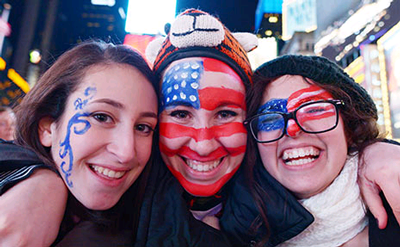
Across town, I chatted with a couple dozen men and women at my friend Loretta’s Upper East Side apartment. As guests slipped into spaces on the elegant couch and chairs, like the old game of Sardines, each sighed, “I’m so nervous about the outcome of this election.”
Nov. 7, 2012 – New York, USA – Young women celebrate the result of the 2012 US Presidential election at Times Square in New York, USA, 07 November 2012. Democratic President Obama defeated Republican candidate Mitt Romney in the US elections. Photo: Rainer Jensen (Credit Image: © Rainer Jensen/DPA/ZUMAPRESS.com)
The pundits had us convinced that what turned out to be a rout would be a cliffhanger.
Maegan and I e-mailed back and forth about our thoughts and feelings.
I quipped that every 20 years, whether we need it or not, we get a “Year of the Woman.”
Women were angry enough in 1992 to vote in record numbers. We’d watched Anita Hill being insulted by the all-male Senate Judiciary Committee when she claimed then U.S. Supreme Court nominee Clarence Thomas had sexually harassed her. Twin assaults on Roe v Wade, Webster v Reproductive Health Services and Planned Parenthood v Casey had brought icy shivers of fear that the reproductive rights hard-won by second wave feminists like me were in mortal danger.
Four pro-choice women were elected to the Senate—a record!—and women won 22 of 24 open Congressional seats that year, when pro-choice Bill Clinton was elected to his first term.
Enter 2012’s Republican War on Women
Again, there were a succession of high profile insults. To name a few:
30-year-old Georgetown University law student Sandra Fluke was denied the chance to speak about why contraceptives should be covered by insurance, and was rewarded by being called a slut by Rush Limbaugh…
An all-male “expert” panel pontificated on women’s reproductive health before a Senate committee (also all-male because the women on the committee were so incensed they walked out)…
Bills in Texas and Virginia sought to force women seeking abortions to submit to 10″ ultrasound “shaming wands”…
Indiana GOP senate candidate Richard Mourdock declared he opposes abortion even after rape, because pregnancy from rape is “something that God intended to happen”…
Missouri GOP senate candidate Todd Akin opined about “legitimate rape” and made the loopy assertion that women’s bodies reject rape-induced pregnancy…
Were enough women, especially younger women, again sufficiently incensed to vote in the numbers needed to sweep Barack Obama into a second term and set a new record for electing pro-choice women?
Says Maegan, “For my generation—the up-and-coming movers and shakers, the wide-eyed, and the ambitious—this election was a pinnacle moment in many of our personal histories. It is an era that shifts towards tolerance and equality of women, same-sex couples, and ethnic minorities. Yet, as we saw in the early stages of election night, it can just as easily be taken away.”
The mood at Loretta’s lightened when the Connecticut senate race broke for Democrat Chris Murphy against World Wrestling Association former CEO, right wing Republican bazillionaire Linda McMahon. Proving once again that women can’t be fooled by lipstick and a pink suit.
Cheers erupted for Maggie Hassan, who will become the only female prochoice Democratic governor in the country.
Bigger cheers when Massachusetts Democrat Elizabeth Warren was declared victorious over Republican Scott Brown.
Biggest cheers were reserved for Mourdock’s defeat, and in rapid succession, Missouri Democratic Senate incumbent Claire McCaskill wiped the floor with Todd Akin.
This War on Women had clearly been won—by women.
Maegan’s take: “Reproductive rights and women’s health remain behind the times, but we are getting somewhere. With women like pro-choice Claire McCaskill in office, instead of her women’s rights antithesis Todd Akin, the country can continue to trudge toward women’s rights reform.”
Maine and Maryland pass ballot measures approving same sex marriage. More cheers for that watershed.
And then the news comes that Obama is over the top—Ohio has once again been the pivotal state that makes him president. On East 77th, a toast, and a sigh of relief.
Maegan describes the scene at Brad’s bar downtown: “Suddenly, the chatty crowd erupts in a roar. The sight I saw on election night was similar to what many of my friends saw in other parts of the country—young people celebrating after their POTUS was reelected.”
Young people made up 19% of voters, an even higher percentage than in 2008. Maegan predicted students should soon be seeing legislation to reform student loans and Obamacare will continue to stream into effect. These are high priority items for her.
The numbers for women across age brackets were even more stunning.
Women as a whole made up 54% of the electorate. They voted for Obama by 55% – 44%. Unmarried women voted for Obama by a whopping 68% to 30%:
Twenty female senators will serve in the 113th Congress, the largest number in US history. Every Democratic female incumbent was reelected.
Journalist Irin Carmon’s salon.com piece taunted, “Still Want to Fight a War on Women?”
What does it all mean? The answer is in our hands.
It means the fight goes on. And any generation that forgets this lesson of history is doomed to repeat it, just as women did after 1992.
In 1994, the right came back with a tsunami known as the Gingrich Revolution and his infamous Contract with America. Many of the women and progressive men elected in 1992 were swept back out of office.
This happened not because women changed their minds but because they failed to vote in the same numbers as they had when they were agitated in 1992. Today, opportunity knocks anew.
After the nasty political acrimony of the last two decades, I believe there is a deep hunger for the leadership qualities women bring, a desire to fix the broken political system and change dysfunctional cultural paradigms. Women are more likely to work across the aisle to find solutions rather than merely engage in adolescent power plays.
But to achieve that goal and get the country moving forward—Obama’s campaign slogan–women must first claim their own power to lead themselves with intention. To take this precious moment in history and make the gains sustainable by advancing a bold agenda, and never withdrawing from the process again.
Too much has already been lost. It will take an enormous amount of work just to repair the damage of the last few years of assaults.
There are positive signs. Almost immediately, I received an e-mail from the Center for Reproductive Rights urging me to sign their Bill of Reproductive Rights.
I am gratified that this language now being heard everywhere—women’s reproductive rights are human rights. The contraceptive coverage movement I created at the national level in 1996 must continue to flourish and become truly universal until Sandra Fluke is recognized as hero, and no one would dare call her a slut. That recognition of women’s full humanity requires a culture shift bigger than we have never had before.
It’s time for the Freedom of Choice Act to guarantee women the right to make their own childbearing choices. Time to repeal the Hyde Amendment and its spawn. Time to insist the president fill the too-many empty seats on the Federal bench expeditiously, with people who respect women’s rights.
It’s time for the Paycheck Fairness Act and other economic policies that ensure all women and men get a fair shake.
For as Maegan e-mails me, “The President can do what he wants without the hesitation he faced during his past four years in office. If the POTUS will be remembered for anything after his presidency by swing voters, it will be his failure or success of stabilizing the U.S. economy.”
As a millennial, a woman, and a Hispanic, she lives at the sweet spot of where the voting demographics are going.
Her advice is exactly right: “We must fight for what we believe in, and continue striving towards our political desires through our votes and our grass roots movements and our voices. We cannot sit still waiting for a promised change. We must insist on change when politicians do not follow through. We must demand it.”
October 31, 2012
They’re Doing It: Teen Activists Madison and Rhiannon Take on Girl Scouts to Save Orangutans
Raise your hand if you were a Girl Scout. Give the Girl Scout Sign if you ever sold Girl Scout cookies. Say “Yum!” if you have ever eaten a Girl Scout cookie.
Many of us have fond memories of Scouting, and I recall the year my father chaired the local cookie drive and stuffed our freezer with twelve dozen boxes. But I’ll bet every one of you said “Yum!” And you have your favorite. I love to curl up with a box of shortbreads, a cup of tea, and a good book.
But who knew these delicious morsels carried within them an unexpected ingredient: death to one of the most adorable animals on Earth, orangutans? Until these two courageous young women, Rhiannon Tomtishen and Madison Vorva, took the issue of unsustainably harvested palm oil head on. Read their inspiring story:
Gloria Feldt: When did you know you had the power to_____? Describe the moment or series of events that let you know you had the power to_____. What did it feel like?
Madison: I knew that I had the power to change Girl Scouts USA’s palm oil policy as soon as I made the connection that unsustainable palm oil which results in deforestation, the endangerment of thousands of species and human rights abuses was an ingredient in the Girl Scout cookies I had sold since childhood. At eleven years old, I didn’t know how I would accomplish this goal, but my passion and conviction led to unrelenting action.
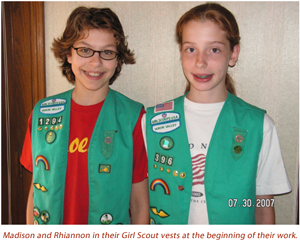 Rhiannon: I knew that I had the power to make my voice heard after attending a lecture by Dr. Jane Goodall in which she described the power youth have to make a difference and the amazing work that young people have already accomplished. Hearing incredible advocate rave about the accomplishments of young people made me realize the power I have to stand up for what I believe in.
Rhiannon: I knew that I had the power to make my voice heard after attending a lecture by Dr. Jane Goodall in which she described the power youth have to make a difference and the amazing work that young people have already accomplished. Hearing incredible advocate rave about the accomplishments of young people made me realize the power I have to stand up for what I believe in.
GF: Tell a little about your background, your family and how you grew up, and what led you to your current work.
Madison: I’m senior in high school at Greenhills School in Ann Arbor, Michigan. I grew up in Plymouth, Michigan with my twin brother, older brother and our three dogs. My parents have set examples throughout my life when it comes to standing up for what they believe to be right. I’ve been fortunate to grow up in a supportive environment, with parents who’ve told me I can accomplish any goal if I never give up. My love for animals led me to start my current activism work. It began when Rhiannon and I earned our Girl Scout Bronze award by raising awareness about the reasons orangutans are endangered, including the destruction of their forest habitat for palm oil plantations.
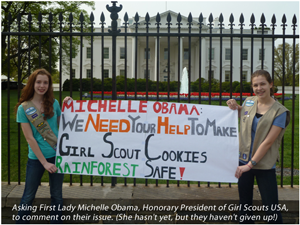 Rhiannon: I was born and raised in Ann Arbor, Michigan. I am the oldest of three, with two younger brothers. For as long as I can remember, my parents have always told me that I can do anything I want if I set my mind to it and work hard enough. When Madi and I discovered that palm oil was in Girl Scout cookies, I never doubted that if we worked hard enough we could convince our organization to change to deforestation-free palm oil that does not contribute to human rights abuses.
Rhiannon: I was born and raised in Ann Arbor, Michigan. I am the oldest of three, with two younger brothers. For as long as I can remember, my parents have always told me that I can do anything I want if I set my mind to it and work hard enough. When Madi and I discovered that palm oil was in Girl Scout cookies, I never doubted that if we worked hard enough we could convince our organization to change to deforestation-free palm oil that does not contribute to human rights abuses.
GF: Who are your role models? Why? What lessons did you learn from them?
Madison and Rhiannon: We look up to Dr. Jane Goodall as our hero and role model. Her groundbreaking work with the chimpanzees was what inspired us to research other endangered great apes, which was how we discovered the plight of the orangutan. Dr. Jane is a selfless, determined and passionate advocate who has spent the past fifty years of her life promoting conservation and spreading the message of peace to people around the world. Every time we have had the opportunity to hear her speak, Dr. Jane reminds us that every single day people impact on our planet, and that young people really can change the world.
 GF: What are you hoping to accomplish in your work?
GF: What are you hoping to accomplish in your work?
Madison and Rhiannon: Our goal is to educate consumers about the destructive impacts of irresponsible palm oil production and to show them how their daily purchasing decisions have global impacts. Furthermore, we are hoping to work with consumers and companies to ensure that the palm oil in their products is produced in an environmentally-friendly and socially-responsible manner. We should not have to choose between purchasing our favorite products and contributing to grave social and environmental issues as a result of an unsustainable palm oil supply chain.
GF: What is the message you’d like to give to the world today?
Madison and Rhiannon: We would like to urge everyone to take a minute the next time you go to the grocery store to check your favorite products for palm oil. You might be shocked at how many cosmetics, candy bars and baked goods are contributing to rainforest destruction and human rights abuses because they contain unsustainable palm oil! Write a letter to the companies that produce your favorite products to let them know that you want them to adopt a deforestation-free policy! Once companies realize their consumers care, their policies will follow suit.
GF: What is the best leadership lesson you have learned?
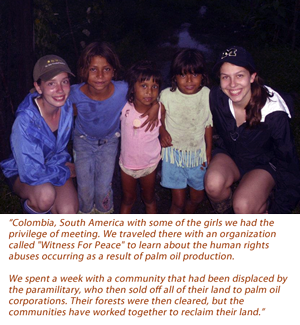 Madison: One of the best leadership lessons I’ve learned is patience. Changing the policy of a huge organization like Girl Scouts USA took five years, and we have now spent a year convincing Girl Scouts USA to adopt a stronger deforestation-free policy. Activism can be draining, but my passion has fueled this cause for the past six years.
Madison: One of the best leadership lessons I’ve learned is patience. Changing the policy of a huge organization like Girl Scouts USA took five years, and we have now spent a year convincing Girl Scouts USA to adopt a stronger deforestation-free policy. Activism can be draining, but my passion has fueled this cause for the past six years.
Rhiannon: I think that one of the most important leadership lessons I have learned is to accept failure as part of the process. Too often we allow our fear of failure to stand in the way of trying something new. A leader knows that it’s okay to fail. You can learn from your mistakes, pick yourself up and try again.
GF: What challenges and obstacles did you encounter and how did you deal with them?
Madison and Rhiannon: The largest challenge we have faced is that as young people we have had to fight to make our voices heard. But because we are youth, we have the luxury of imagining a vision that appears irrational and we can dream in a way that is not limited by an adult’s perspective. We have been able to turn our biggest weakness, our age, into a strength. Age, gender or background should not be limiting factors achieving your goals; if you have passion, you can change this world.
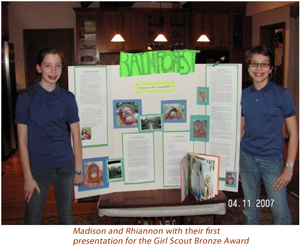 GF: What other observations or advice about women, power, and leadership would you like to share? Especially, what messages do you have for other girls who are younger than you?
GF: What other observations or advice about women, power, and leadership would you like to share? Especially, what messages do you have for other girls who are younger than you?
Madison: Everyone is passionate about something. The key to activism is identifying what it is exactly that moves you to action. For me, it was seeing the pictures of orangutans that had been burned to death after entering the palm oil plantations in search of food. I just couldn’t believe that this is happening, and that my favorite products were contributing to this kind of abuse, let alone the destruction of millions of acres of rainforest and human rights abuses. I would tell other girls to start small and grow big. Rhiannon and I began with a handmade poster board, and eventually grew our campaign to a national and international platform.
I would also like to share my favorite quote from Dr. Jane Goodall: “If you really want something, and really work hard, and take advantage of opportunities and never give up, you will find a way.”
For more information, people can check out Rhianon and Madison’s website: www.projectorangs.org, or follow them on Twitter: @Girlscout Honor or Facebook: Project ORANGS.
To send a message to Girl Scouts USA, supporters can send emails here. If anyone has questions or comments they can email Madison and Rhianon at: info@projectorangs.org
To learn more about their project, people can check out their Brower Youth Award Video.
October 24, 2012
She’s Doing It: Juliet Yaa Asantewaa Asante’s Media Leads African Women to Power
I met Juliet Asante through a most remarkable friend, Eva Haller. Eva can always be counted on to be surrounded by people who are doing amazing, significant things for others in this world, and Juliet is no exception. So I was thrilled when this media entrepreneur and activist, the founder of Eagle Productions Ltd, (an events and communications company; developing and aggregating content for multiple platforms; with operations in a number of African countries), agreed to answer a few questions.
I think you’ll be inspired and agree that Juliet is definitely a woman who is Doing It!
Gloria Feldt: When did you know you had the power to_____?
Juliet Asante: I knew I had the power to change my world and make a difference when I, (as an African girl, at a time when not many people dared) was able to raise money to start my first television show; having started out with only a cell phone and absolutely no money or guidance.
GF: Describe the moment or series of events that let you know you had the power to:
JA: My first major event on my path was getting the part in an HBO movie that starred Omar Epps. “Deadly Voyage,” a true story based in Africa, was auditioned for by the ‘best’ in the industry… and I got the role I auditioned for. This gave me the confirmation and credibility I needed at the time to explore my talents.
The second event I remember, was winning the writing competition to produce a road show for a product for Unilever, and producing this while in my final year of University in another city. I commuted for 8 hours between two cities in every 24 hours for my entire final year at school.
I felt powerful. I felt my mental limitations drop away. I remember feeling like I could do it and I could see the world opening up to me. I also felt that my path was going to be a one of resistance, as I had already begun to see that in many ways, but I knew I’d find the strength to move on. I just knew….
GF: Tell a little about your background, your family and how you grew up, and what led you to your current work.
JA: I am a Ghanaian woman who had my main growing up years in Liberia. At one point between the ages of 9 & 10, I got very sick and couldn’t walk and had to use the wheel chair. Having a disabled child was a very difficult time for my family and taught me huge lessons about survival. Later on, my family also got caught up in the Liberian war and lost everything….
At some point, I had to live with relatives in Ghana whiles my parents were away and it is during this period that my lessons in survival, inner knowledge and strength were solidified. Also was my commitment to be far more than my limitations and to try and impact my world.
I also knew that an important path to self realization was education; so having built a couple of successful companies, going through a difficult marriage and having a beautiful child, I took time off to get my Masters at the Harvard Kennedy School.
I am now focused on the next stage of my life. Focusing on making my companies better and being a good mother… as well as a good partner.
GF: Who are your role models? Why? What lessons did you learn from them?
JA: One of my greatest mentors is Pat Mitchell, The CEO of the Paley Center. Having met her in 2008 on a Fortune/State department mentorship program; she has had the greatest influence on my life since my mother.
My mother also served as a great role model. Growing up, I saw her strength and struggles, as well as her failures and this has served as my greatest check and inspiration.
I am named after one of the most powerful woman in my country. My middle name is Yaa Asantewaa. This grandmother in her 60s, in the 19th century, lead one of the most successful resistance to the British invasion of Ghana. She is truly my hero!
GF: What are you hoping to accomplish in your work?
JA: My main area is Media and I am passionate about youth and women empowerment. Using Media as a tool to find a unique way to empower women and the many young people in the areas I impact, is something I have been working on for a while and I’m beginning to see real progress in.
GF: What is the message you’d like to give to the world today?
JA: There may be gold right next to you. Maybe in that woman, maybe in that child…
GF: What is the best leadership lesson you have learned?
JA: Leadership is not about being at the forefront and it doesn’t have to be permanent. There is great joy in stepping back and letting it happen….
GF: What other observations or advice about women, power, and leadership would you like to share?
JA: Power is not something you have to scream out. It is in the little things…everyone can have and use power. Getting real power is in little steps and so we must take those steps every day, one small way at a time….
October 19, 2012
SheBrand Superstar
Recently, I sat down with Liz Dennery Sanders of She Brand who shares the secrets of successful branding with women entrepreneurs, coaches and consultants,
saying “t hose who put this secret to work in their business never have to worry where their next client is coming from.”
In Liz’s SheBrand SuperStar series, she features female entrepreneurs “who are out there in the trenches each and every day, making things happen and affecting other people’s lives for the better.”
Please enjoy this reprint of her interview.
Name: Gloria Feldt
Occupation: Speaker, Author, World Changer
1. What are three words that best describe your personal brand?
Courage. Inspiration. Integrity.
2. Tell us why you’re awesome in two sentences or less?
I have cracked the code that can bring women to parity in top leadership positions by 2025. I’m eyeball deep in creating a program (“Take The Lead”) to do just that based on my book No Excuses: 9 Ways Women Can Change How We Think About Power, which teaches women how to embrace their “power to” lead and live without limits.
3. What are your three biggest indulgences
Bread
Shoes
Gifts for my grandchildren
4. What is your biggest pet peeve?
People who say they will do something and then they don’t.
5. If you could have dinner with anyone (living or not) who would it be and why?
My father, who died 18 years ago. I’d like to be able to thank him for telling me that I could do anything my “pretty little head desires.” It took me a lifetime to be able to hear his message and now I get to share it with other women.
6. Why is having a powerful personal brand important to you?
The most important No Excuses Power Tool is “Define yourself first, before someone else defines you.” We are all going to be defined. Better to do it for ourselves in a way that is authentic and meaningful to us than to allow others to present us to the world.
7. What is your #1 marketing tip for fellow female entrepreneurs?
No one can market you as well as you, so you have to make that call.



